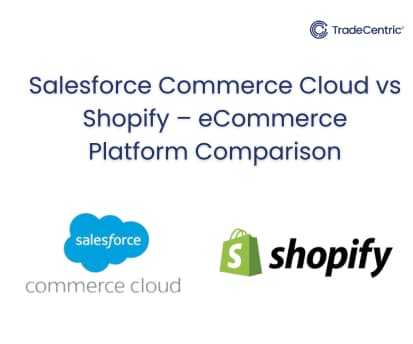Table of Contents
Overview of Salesforce Commerce Cloud and Shopify
Salesforce Commerce Cloud and Shopify are two leading eCommerce platforms designed for businesses of all sizes, with each offering a suite of tools and features to create, manage, and grow online stores.
Salesforce Commerce Cloud, which is part of the Salesforce ecosystem, specializes in comprehensive solutions for enterprise-level businesses. It has powerful capabilities for omnichannel commerce, personalized shopping experiences, and seamless integration with other Salesforce products like CRM and Marketing Cloud.
Shopify targets mid-market to enterprise businesses with a scalable platform that is designed for organizations in growth mode. It emphasizes ease of use, extensive app integrations, and customizable themes to empower businesses to launch and manage their online stores efficiently.
Both platforms have different use cases and offer various pricing plans. Let’s explore more about each and what to consider when choosing between Salesforce Commerce Cloud and Shopify for your business.
The State of Salesforce Commerce Cloud
Salesforce Commerce Cloud remains a powerhouse in the eCommerce industry and is widely recognized for its enterprise-grade features and scalability. Its strengths lie in its ability to deliver personalized shopping experiences across multiple channels, including web, mobile, social, and physical stores.
Recent advancements in Salesforce Commerce Cloud include enhancements in AI-driven personalization, enabling retailers to deliver targeted, relevant product recommendations and marketing messages to their customers. Additionally, its integration with other Salesforce products facilitates seamless data flow and unified customer experiences across sales, marketing, and customer service touchpoints.
The State of Shopify
Shopify continues to gain momentum as a preferred choice for businesses seeking a scalable and user-friendly eCommerce platform. Its intuitive interface and extensive ecosystem of apps and integrations empower merchants to quickly launch, manage, and optimize their online stores without the need for extensive technical expertise.
Recent updates to Shopify have focused on enhancing its capabilities for international expansion with features like multi-currency selling and localized storefronts. Shopify’s focus on sustainability and social responsibility also resonates with many brands, aligning with their values and objectives.
Salesforce Commerce Cloud vs Shopify: Comparison of Features
When comparing Shopify and Salesforce Commerce Cloud, evaluating their key features and functionalities is essential to determine which platform best aligns with your business needs.
Customization and Flexibility
Shopify offers extensive customization options through its theme editor, allowing merchants to tailor their online stores to their brand’s aesthetic and functionality requirements. However, customization options may differ from Salesforce Commerce Cloud, which provides more tools for developers to create highly tailored solutions for enterprise-level businesses.
Scalability
Both platforms are designed to scale with businesses as they grow. Shopify provides a scalable infrastructure that can handle increased traffic and sales volume, while Salesforce Commerce Cloud offers enterprise-level scalability with features like cloud-based architecture and support for global expansion.
Integration Capabilities
The Salesforce Commerce Cloud platform offers seamless integration with other products, such as Salesforce CRM and Marketing Cloud, creating a unified platform for managing customer data and marketing campaigns. Shopify also offers a wide range of integrations with third-party apps and services through its App Store, allowing suppliers to extend the platform’s functionality to meet their specific requirements.
Salesforce Commerce Cloud and Shopify also empower businesses to leverage social media platforms as integral components of their eCommerce strategies. By integrating with social channels, enabling social commerce, and facilitating engagement and advertising, both platforms help businesses drive growth and succeed in today’s social-first digital landscape.
Both Salesforce Commerce Cloud and Shopify work with TradeCentric to ensure their customers can offer integration capabilities such as PunchOut, PO Automation and Invoice Automation.
Pricing and Total Cost of Ownership (TCO)
Between Salesforce Commerce Cloud and Shopify, one may require a higher upfront investment and ongoing maintenance costs than the other, depending on your needs. However, the total cost of ownership may vary depending on factors such as customization, integration complexity, and business scalability.
Support and Resources
Both platforms offer customer support options, including documentation, tutorials, and community forums. Salesforce Commerce Cloud provides dedicated support for enterprise-level clients, while Shopify priority support and account management for its merchants.
Key Strengths of Salesforce Commerce Cloud vs Shopify
Salesforce Commerce Cloud and Shopify each offer distinct strengths that cater to different business needs and priorities in the eCommerce landscape.
Key Strengths of Salesforce Commerce Cloud:
- Enterprise-Grade Features: Salesforce Commerce Cloud offers advanced features such as AI-driven personalization, omnichannel commerce capabilities, and robust scalability to handle high transaction volumes and complex business requirements.
- Integration with Salesforce Ecosystem: One of its standout strengths is seamless integration with other Salesforce products like Salesforce CRM, Marketing Cloud, and Service Cloud. This unified ecosystem enables suppliers to create unified customer experiences across multiple touchpoints, streamline operations, and leverage customer data for personalized marketing campaigns and customer service.
- Comprehensive App: The Salesforce Commerce Cloud app is a powerful eCommerce solution that empowers businesses to create engaging online shopping experiences for their customers. With robust features such as customizable storefronts, seamless integration with Salesforce CRM, and AI-driven personalization capabilities, the Commerce Cloud app enables businesses to drive sales and foster customer loyalty. Its cloud-based architecture ensures scalability and flexibility, allowing businesses to adapt to changing market trends and customer demands easily. From product merchandising to order management and customer service, the Salesforce Commerce Cloud app provides a comprehensive suite of tools to streamline the entire eCommerce journey. You can find TradeCentric on the Salesforce AppExchange here.
- Customization and Flexibility: Salesforce Commerce Cloud provides extensive customization options so developers can create highly tailored solutions to meet specific business needs. Its architecture and development tools allow complex integrations, customizations, and unique storefront experiences.
- Global Expansion: With support for multiple languages, currencies, and tax regulations, Salesforce Commerce Cloud simplifies global expansion for businesses. Its cloud-based infrastructure ensures reliable performance and scalability across international markets, making it an attractive option for businesses with a global presence or aspirations.
Key Strengths of Shopify:
- Ease of Use and Quick Setup: Shopify is renowned for its user-friendly interface and intuitive setup process, making it accessible to businesses of all sizes, including those with limited technical expertise. Merchants can launch their online stores quickly, manage products, and process orders with minimal hassle.
- Scalability and Reliability: While initially targeting small to medium-sized businesses, Shopify has proven its scalability, supporting businesses as they grow from startup to enterprise levels. Its cloud-based infrastructure ensures reliability, with built-in scalability to handle surges in traffic and sales during peak seasons.
- Extensive App Ecosystem: Shopify’s App Store offers various third-party apps and integrations, allowing merchants to extend the platform’s functionality to suit their unique needs. From marketing and analytics to inventory management and shipping, there’s a solution for almost every aspect of eCommerce operations.
- Responsive Customer Support: Shopify provides comprehensive customer support through various channels, including live chat, email, and phone support. Suppliers can also benefit from an active community forum and extensive documentation, ensuring they have the resources to address any issues or questions they encounter.
Shopify vs Salesforce Commerce Cloud: Pricing
When comparing the pricing models of Shopify and Salesforce Commerce Cloud, it’s essential for suppliers to consider the value they offer to the size and needs of their business.
Shopify typically adopts a subscription-based pricing structure, with plans tailored to accommodate businesses at different stages of growth. Its pricing tiers often include features such as unlimited products, bandwidth, and 24/7 customer support. Additionally, Shopify’s pricing model ensures predictability for merchants, allowing them to budget effectively and scale their businesses without unexpected costs.
On the other hand, Salesforce Commerce Cloud’s pricing model may vary depending on factors such as business size, customization requirements, and desired features. While it may involve a higher initial investment than other platforms, suppliers benefit from access to enterprise-grade features, scalability, and integration within the Salesforce ecosystem. Additionally, Salesforce Commerce Cloud’s pricing often includes ongoing support, maintenance, and access to updates, allowing businesses to receive continuous value from their investment.
Overall, both Shopify and Salesforce Commerce Cloud offer pricing models that align with B2B eCommerce businesses’ diverse needs and budgets, empowering them to choose the solution that best fits their requirements for growth and success.
Shopify vs Commerce Cloud: Which is Right for Your Business?

Salesforce Commerce Cloud makes a powerful, flexible solution for enterprise suppliers to continue scaling their stores and driving sales. However, Shopify also has a trusted solution that millions of suppliers use worldwide.
Salesforce Commerce Cloud customers and Shopify customers prefer eCommerce platforms that provide a user-first experience with an easy-to-use platform. However, depending on the technical knowledge of your team, some assistance may be needed to get your platform of choice up and running.
With TradeCentric, you can access hundreds of integrations for more than 75 eCommerce systems and 150 ERP/eProcurement solutions. We proudly partner with SFCC and Shopify and work closely with both providers. No matter which eCommerce platform you use, our Platform is purpose-built to streamline the integration and transaction processes. Reach out to us for more information.




